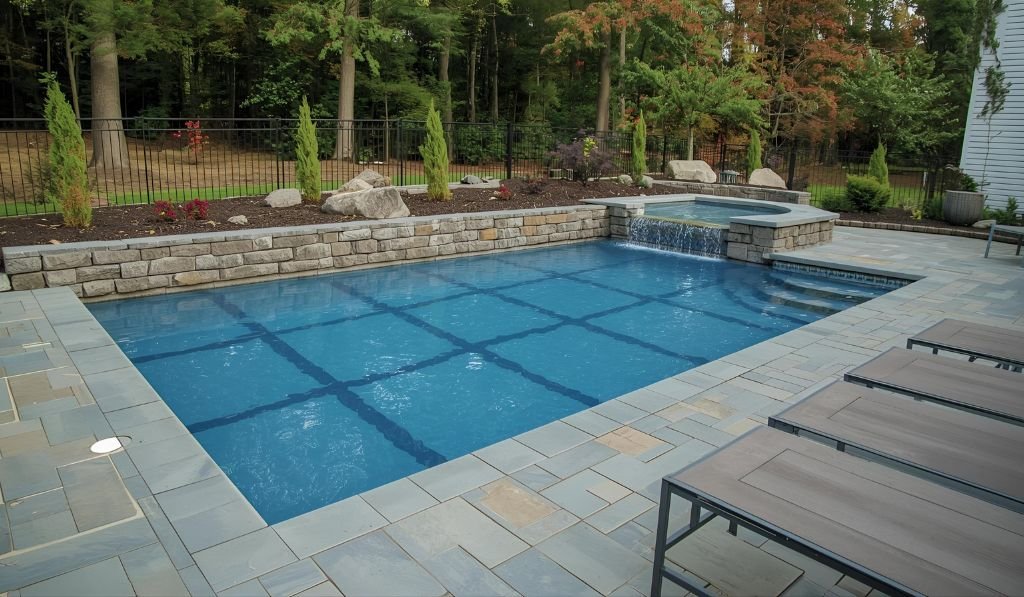When designing the perfect poolside oasis, few features are as essential as a well-chosen pool deck. Not only does the deck serve as the surrounding space for lounging and socializing, but it also plays a critical role in the aesthetics and safety of your pool area. Among the various materials available for pool decks, pavers for pool deck have gained immense popularity due to their versatility, durability, and aesthetic appeal.
Pavers, made from a variety of materials including stone, concrete, and brick, are highly sought after for pool decks due to their practicality and ability to enhance the beauty of any outdoor space. They offer a unique blend of form and function, ensuring that your pool area remains not only stunning but also safe and easy to maintain.
In this article, we’ll delve into why pavers are an excellent choice for pool decks, explore the different types of pavers available, and provide insights into the installation and maintenance of pavers. Whether you’re a homeowner looking to revamp your backyard or a contractor searching for the best decking options, this guide will help you make informed decisions about pavers for pool deck.
Why Choose Pavers for Your Pool Deck?
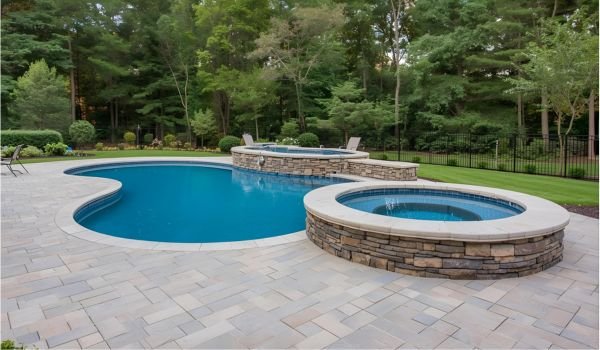
When considering materials for your pool deck, there are many factors that come into play. Pavers stand out due to their unique blend of aesthetics, durability, and ease of maintenance.
Aesthetic Appeal and Customization
Pavers come in a wide array of styles, colors, and textures, allowing you to tailor the design to your personal preferences. Whether you’re drawn to the rustic charm of natural stone, the sleek modern look of concrete, or the classic appeal of brick, there’s a paver that fits your vision. Pavers can also be arranged in various patterns—such as herringbone, basketweave, or simple straight lines—to create a one-of-a-kind poolside design. The ability to mix and match pavers with other landscaping elements, such as plants, water features, and lighting, further enhances the visual appeal of your pool deck.
Durability
Poolside environments are notoriously harsh. The combination of water, chlorine, heat, and foot traffic can quickly wear down less durable materials. Pavers, however, are engineered to withstand these conditions. Made from concrete, natural stone, or brick, pavers are built to last and can endure the challenges of a poolside setting. Their resilience ensures they won’t crack, fade, or deteriorate quickly, making them a long-term investment.
Slip Resistance and Safety

One of the most important considerations for any pool deck is safety. Wet surfaces can become dangerously slippery, posing a risk to swimmers and guests. Fortunately, guide pavers for pool deck offer excellent slip resistance, especially when compared to smooth concrete or tile surfaces. Many pavers are designed with textured surfaces, providing additional traction even when wet. This feature is particularly valuable around the pool, where slips and falls are more likely to occur.
Ease of Maintenance
Unlike other pool deck materials, pavers are relatively easy to maintain. In the unlikely event of a paver becoming damaged or stained, individual pavers can be replaced without disturbing the rest of the deck. Additionally, pavers are often sealed to resist stains and dirt, which helps keep them looking pristine for years. Regular cleaning, typically with a pressure washer, is enough to remove debris and maintain their appearance.
Types of Pavers for Pool Decks
Choosing the right paver material is a critical decision when designing your pool deck. Each type of paver offers distinct advantages, so it’s essential to understand the options available. Here are some of the most popular paver choices for pool decks:
Concrete Pavers

Concrete pavers are one of the most common choices for pool decks due to their affordability and versatility. They come in a variety of shapes, sizes, and colors, allowing homeowners to customize their poolside space. Concrete pavers are also highly durable, resistant to cracking, and can withstand the harsh poolside environment. For added texture and slip resistance, many concrete pavers are manufactured with a rough or textured surface.
Natural Stone Pavers
For those seeking a more luxurious and timeless look, natural stone pavers—such as travertine, limestone, and granite—are an excellent option. These pavers offer natural variations in color and texture, adding an organic and sophisticated touch to the pool deck. Stone pavers are also highly durable and can withstand exposure to the elements without fading or cracking. However, natural stone can be more expensive than other materials, making it a premium option for those willing to invest in their poolside aesthetic.
Brick Pavers
Brick pavers bring a classic, traditional charm to any pool deck. Known for their distinctive red, orange, or brown hues, brick pavers offer warmth and texture that complement a variety of pool styles. Brick pavers are also highly durable and are resistant to cracking, making them a reliable choice for poolside environments. Like concrete pavers, brick pavers can be easily replaced if damaged, which helps maintain the integrity of the entire deck.
Porcelain Pavers
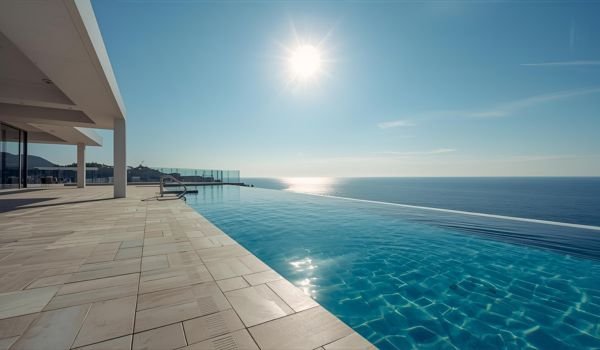
For a more contemporary feel, porcelain pavers are an excellent choice. These pavers are manufactured with advanced technology, making them extremely resistant to wear, stain, and fading. Porcelain pavers are available in a wide range of colors, including options that mimic the appearance of stone, wood, or tile. They are also non-porous, which means they won’t absorb water or chemicals, making them a great option for poolside use.
Rubber Pavers
For a softer, more cushioned surface, rubber pavers can be an excellent choice, especially for families with young children. These pavers are shock-absorbent, providing an added layer of safety in case of a fall. They are also slip-resistant and highly durable, making them ideal for pool decks. Rubber pavers are often made from recycled materials, adding an eco-friendly element to your pool area.
How to Choose the Right Pavers for Your Pool Deck

Selecting the perfect pavers for your pool deck involves balancing aesthetics with functionality. Here are some key factors to consider when making your choice:
Slip Resistance
Safety is paramount around the pool, so it’s crucial to choose pavers that offer excellent slip resistance. Textured pavers with non-slip surfaces help to prevent accidents and ensure that your pool area remains safe, even when wet.
Durability
Pavers should be able to endure the challenges posed by the pool environment. Look for materials that are weather-resistant, fade-resistant, and capable of withstanding constant exposure to water and chemicals.
Budget
While pavers can vary in price depending on the material, there are options to suit every budget. Concrete pavers are generally the most affordable, while natural stone and porcelain pavers tend to be more expensive. However, it’s important to keep in mind that investing in higher-quality materials can reduce long-term maintenance costs.
Aesthetic Preferences

Your choice of pavers should complement the design of your pool and the surrounding landscape. Consider the color scheme, texture, and overall style you wish to achieve. For instance, if you have a modern pool, you might prefer sleek porcelain or concrete pavers. If your pool area leans more rustic or Mediterranean, natural stone pavers could be the perfect choice.
Installation of Pavers for Pool Decks
Once you’ve chosen your pavers, the next step is installation. While professional installation is recommended for larger or more complex pool deck projects, smaller DIY installations can also be successful with the right preparation. Here’s a brief guide to installing pavers for your pool deck:
Prepare the Base
Before installing pavers, it’s essential to prepare the base. This includes removing any existing materials, such as grass or old decking, and ensuring the ground is level. A well-prepared base is critical for ensuring the longevity and stability of the pavers.
Lay the Pavers
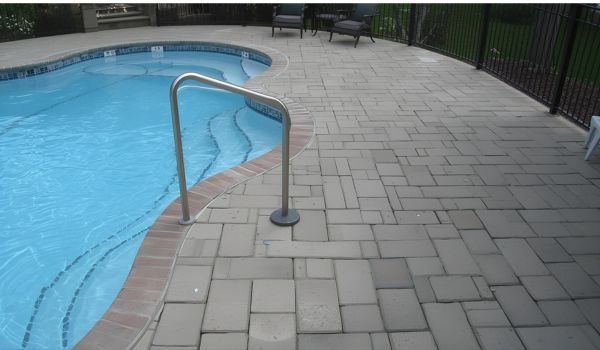
Begin laying the pavers from one corner, working your way across the deck. For a more intricate design, use string lines to ensure that each row of pavers is straight. Be sure to leave small gaps between the pavers to allow for the sand and compaction process.
Compact and Seal
Once the pavers are in place, use a mechanical compactor to press them into the base. This ensures the pavers are securely fitted and won’t shift over time. After compacting, apply joint sand to fill the gaps between the pavers and ensure stability. Finally, sealing your pavers helps protect them from stains and weathering.
Maintenance Tips for Pavers Around the Pool
Proper maintenance ensures that your pool deck pavers stay looking their best for years to come. Here are some essential tips for keeping your pavers in top condition:
Regular Cleaning
Sweep the pavers regularly to remove debris, and use a pressure washer to clean the surface. Avoid using harsh chemicals, as these can damage the pavers and the surrounding landscape.
Preventing Stains
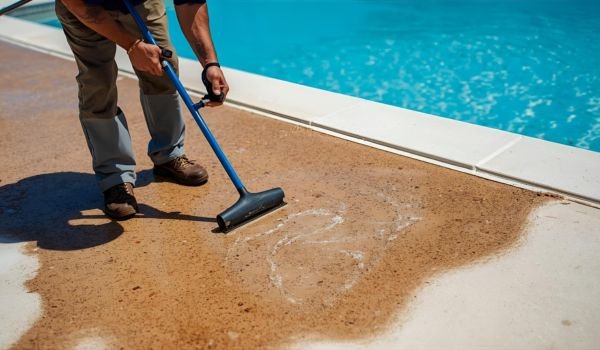
Pool water, chlorine, and sunscreen can sometimes leave stains on your pavers. For stubborn stains, use a mild detergent and scrub with a brush. For deeper cleaning, a paver cleaner designed for your specific material can be used.
Sealing Pavers
To preserve the color and finish of your pavers, consider sealing them every few years. Sealing protects the pavers from water, dirt, and stains, and can prevent the growth of moss or algae.
Conclusion
A perfect guide Pavers for pool deck offer a perfect combination of beauty, durability, and safety, making them an ideal choice for anyone looking to enhance their poolside space. With the wide variety of materials available, it’s easy to find pavers that suit your style, budget, and functional needs. By carefully considering the installation process and committing to regular maintenance, you can ensure that your pool deck remains an inviting and safe environment for years to come. Whether you opt for the timeless elegance of natural stone or the sleek look of concrete, the right pavers will elevate your poolside experience to new heights.
